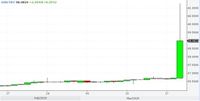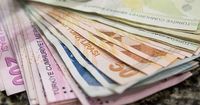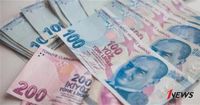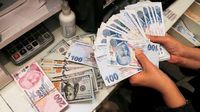On March 19, 2025, the Turkish lira reached a new historical low, reflecting mounting economic challenges amid significant political turmoil. The dollar saw a notable increase against the lira, rising by over 10 percent during trading sessions, which raised concerns among investors and the public alike.
As of 10:46 AM local time, the exchange rate surged to 40.55 lira per dollar, marking its highest value in recent weeks, and earlier, it peaked at an alarming 41.1 lira. Comparatively, the previous closing level sat at 36.6825 lira, illustrating a clear depreciation of the Turkish currency against the dollar.
This financial vulnerability coincided with a larger narrative of instability, fueled by the detention of Istanbul's opposition mayor, Ekrem Imamoglu, and several of his associates, which occurred just hours prior. The abrupt actions by the authorities surrounding Imamoglu's arrest spurred fears regarding the upcoming elections and the state of democracy in Turkey.
In context, the value of the dollar had already risen nearly 2 percent to a significant 37.22 lira earlier the same morning, while the Istanbul Stock Exchange index plummeted by 6.87 percent at its market open. The base index of the Borsa Istanbul, which tracks leading shares, further declined by 6.9 percent, which led to the temporary suspension of trading—a move indicating severe market distress.
This downward trajectory in the Turkish economy has not just impacted currency value but has ripple effects across various sectors. The yield on 10-year government bonds reached its highest point for the year, suggesting a pessimistic outlook among investors regarding Turkey's financial stability moving forward. Companies operating within the country also felt the hit, as stock prices tumbled amid the prevailing uncertainty.
Market analysts identified the various factors contributing to the lira's decline, attributing it partly to the political circumstances surrounding Imamoglu's arrest. The Istanbul mayor is a member of the Republican People’s Party (RNP), the second-largest party in Turkey's parliament, which controls 128 out of 600 seats. This prompts questions regarding political repression and the implications for competitive democracy in the nation.
Imamoglu, who has been a prominent critic of President Recep Tayyip Erdogan, was taken away from his home in a show of force that resonates deeply within Turkey’s turbulent political history. His apprehension not only raises issues about individual freedoms but also casts doubt over the administration’s integrity ahead of the presidential elections.
The political upheaval has resonated beyond currency matters. Media reports indicated that major social media platforms have been restricted as part of a crackdown on dissent. Accusations surrounding the annulment of Imamoglu's diploma, which prosecutors argued prevents him from running for office, illustrate the contentious environment as Turkey approaches future elections. According to reports, the Istanbul University’s decision to revoke the mayor's qualification stemmed from the local prosecutors' requests, adding a layer of legal disputes into an already fraught political landscape.
Thus, as the lira approaches unprecedented lows and markets react with skepticism, the convergence of economic decline and political unrest places Turkey’s future stability in jeopardy. Observers remain acutely aware of the discomfort among the citizenry as they face a dual crisis—one of currency and governance.
The ensuing narrative underscores a broader theme of instability across the region, where countries balancing economic demands and political representation frequently face increased turbulence. The situation in Turkey highlights the delicate fabric of democracy, economic health, and civil freedoms that can quickly unravel under pressure.
With analysts warning of continued volatility in economic indicators, Turkey finds itself at a critical juncture. The actions taken by authorities against political figures may have longer-term ramifications, not just for individual freedoms but for the overall health of the nation’s economy as well. As events unfold, the international and domestic responses will shape how Turkey navigates its current challenges.




